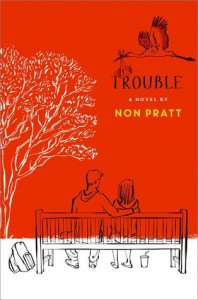I received this book for free in exchange for an honest review. This does not affect my opinion of the book or the content of my review.
 Immaculate by Katelyn Detweiler
Immaculate by Katelyn Detweiler Also by this author: The Undoing of Thistle Tate
Published by Penguin on May 26th 2015
Genres: Contemporary, Pregnancy, Tough Topics, Young Adult
Pages: 464 •Format: ARC •Source: Publisher
Goodreads

Mina is seventeen. A virgin. And pregnant.Mina is top of her class, girlfriend to the most ambitious guy in school, able to reason and study her way through anything. But when she suddenly finds herself pregnant—despite having never had sex—her orderly world collapses. Almost nobody believes Mina’s claims of virginity. Her father assumes that her boyfriend is responsible; her boyfriend believes she must have cheated on him. As news of Mina’s story spreads, there are those who brand her a liar. There are those who brand her a heretic. And there are those who believe that miracles are possible—and that Mina’s unborn child could be the greatest miracle of all.
 * Thanks so much to Penguin Young Readers for this review copy!
* Thanks so much to Penguin Young Readers for this review copy!
The synopsis for Immaculate is evocative, instantly grabbing readers’ attention with its contradictory premise- a pregnant virgin- and its undeniable mystery. From the instant I came across the synopsis I knew I had to read it, despite a hesitation about how the topic of immaculate conception would be handled. Would it be preachy? Would it be a religious book, or rather a mystery to uncover a scientific explanation by the end? Would it be an “issue” book about the hardships and stigmas of teen pregnancy? Immaculate draws bits and pieces from all of these potential labels, but ultimately is in a class of its own as far as books about teen pregnancy go. It’s a well-written, thoughtful tale of a girl who is both gifted and burdened with an extraordinary happening, and her journey to not only understand it, but to overcome the extreme societal reactions that are triggered when the impossible seems to happen.
When I read a contemporary novel that handles tougher topics, whether it be politics or pregnancy, one of the most important thing I look for is if the narrative is well-balanced. Immaculate is well-balanced in almost every way. Mina is an upstanding, intelligent young protagonist who’s not above being impacted by the cruel and slanderous nature of her peers and neighbors. Detweiler manages to write a protagonist who is both strong and vulnerable in quiet ways, and explores a large range of emotions and reactions from the supporting cast: an outraged father, a disgusted boyfriend, an unwaveringly faithful mother, a bitter student body, and a small handful of loyal friends. Detweiler explores the knife’s edge of celebrity that comes with being a public figure, the thin line between acceptance and hate, and the precarious balance between being the bringer of a miracle or the face of a heretic. I found that I couldn’t stop reading because I had to know what people’s reactions would be as the news of Mina’s pregnancy spread, and the consequences it would have for her and her baby. I was fascinated and appalled at the very brutal depiction of how people, especially behind the anonymity of the internet, reacted to Mina’s situation, even though she was seeking no purposeful attention for her pregnancy.
There are no doubt parallels in the narrative to the story of Mary, Jospeh, and Jesus, but it’s far from a religious book. Mina mentions that she’s brought up Lutheran, but this experience really makes her evaluate her own relationship with religion, as she reflects upon what this could mean and scours many religious and historical texts for references of immaculate conception (which she finds is prevalent in the mythology of most cultures). I really appreciated that Detweiler didn’t choose to make this book a heavy retelling with a blatant Christian message, but rather explored different peoples’ capacity to accept miracles and cast judgement. A running theme throughout the book is people’s reactions to anything extraordinary, specifically when it’s something that they see is “threatening” their religious values or history. It’s heartbreaking yet sadly pretty realistic to see the horrible, terrible things people do and say to Mina (that she’s going to burn in hell for her lies, that she’s a heretic, that she’s blemishing the foundations of Christianity, etc.) when she’s made no claim to be a religious figure; rather, the idea (in the Western world, at least) of immaculate conception is so tied to Christian doctrine that people cannot separate Mina’s situation from a religious claim. The narrative also explores the issue that in this day in age with such advanced science and technology, despite many still holding religious beliefs, that most of society is so unable to accept the existence of a miracle, of something that cannot be explained.
But I will say that in our times we’ve reached a sorry, sad state of cynicism. That we’ve stopped believing that miracles-any miracle, no matter how small or large- are inherently possible. We’ve become so obstinately certain that we can explain every last detail about the world around us…we’ve lost that humble, grounding belief that there are things and acts outside of our power to comprehend. -pg 381
Broken up into three trimesters, the novel faces questions of faith, acceptance, cruelty and miracles with increasing anxiety as readers wait for an inevitable confrontation. Despite these deeper topics and tougher issues about human behavior, the novel also depicted a lot of great relationships through those who do support Mia and the vast array of decisions she has to make, from what to do with the pregnancy to how it will change her future plans for college and work. In particular I appreciated seeing the relationship between Mina and her OBGYN, who treats her like an adult rather than a teenager who was acting irresponsibly, providing her with quality care and advice throughout the duration of her pregnancy. While Mina’s case is a peculiar one, most pregnant teenagers (if not all) face extreme stigma and slut-shaming in society. Detweiler does such a good job of portraying these challenges while showing how important an understanding support system is for girls who find themselves in this predicament is.
Overall: Immaculate is a thought-provoking debut that is so much more than an issue book about teenage pregnancy. It explores society’s capacity for both kindness and cruelty, and questions the inability of a strongly religious society to accept modern miracles. The narrative did slow a little at times, featuring some repetitive inner dialogue from Mina as she ruminates about her situation, but the writing is strong and compelling. I also wished that Mina stood up for herself more as the level of harassment at her school and online increased. Yet Immaculate was impossible for me to put down, as I had to find out how Mina fared against an increasingly aggressive community. If you’re going to read a contemporary novel that will keep you on your toes this summer, Immaculate is the one to choose.
*Please note that all quotations are subject to change as they were taken from an advanced reader copy. Please check a final copy of the book for exact quotations.
You May Also Like:
Reading this book contributed to these challenges:
- Goodreads Challenge


















Okay, I’m intrigued. I want to know how the heck that storyline is wrapped up!
On the other hand, I’m conflicted because, SO MANY WAYS THIS STORY COULD GO WRONG.
Marking it as a possible ‘to-read’ on Goodreads. 🙂
It was SO compelling (and the writing itself was great too!) that I think it’s worth the read even if the premise makes you a bit wary! Plus I always love books that tackles a tough topic without turning it into an “issue” book, you know?
Yes, definitely!
Question: Were you happy with the way the whole immaculate conception aspect was summed up at the end (without spoilers). As in, did you find it to be a satisfying end or was the concept better than the actual reason behind it (if that makes any sense?!)
I’ll admit, this is a REALLY hard question to answer without spoilers! I’m satisfied with the message at the end of the book rather than the reasoning, if that makes any sense? (Sorry, just don’t want to run anything for you!) I definitely didn’t find the end to be silly or unreasonable though, if that helps!
I’ve been curious about this book since I heard about it, but also incredibly skeptical, so I appreciate the thorough review! I didn’t realize it had released already–for some reason, I thought it was coming out later in the summer. The premise definitely sounds like it could be thought-provoking, and I’m glad you said the book was nuanced and not preachy, since that’s what I was worried about.
I wouldn’t say the book is preachy at all! And I think Detweiler did a really good job of incorporating bits of religion without making the book take a Christian slant. It’s more about Mina having a Lutheran background and how her own beliefs are challenged by this situation, but even that is really only a small part of the narrative. It’s much more focused on that way society, especially a Western Christian one, reacts when anything threatens to possibly change their beliefs or doctrine. In some ways it’s really heartbreaking to see the negative reactions, but incredibly fascinating too to see how a “miracle” can turn incredibly normal/rational people into either believers or haters with a mob-like mentality.
This definitely sounds like an interesting read. I may have to pick it up some time! There is one thing that confuses me, though. In Christianity, the Immaculate Conception isn’t Mary’s conception of Jesus. It’s the belief that Mary herself was conceived without original sin. It’s a belief almost exclusively held by Catholics, so it probably wouldn’t have come up in a Lutheran household. Is Mina confusing the Immaculate Conception with the Incarnation (Jesus being conceived by Mary), or was she researching the idea of virgin mothers being conceived without sin?
Excellent question! Mina does a lot of research across many religious traditions and learns about the difference between the Immaculate Incarnation of Mary’s sinless birth, and of Jesus’ birth. I think that’s why the book is called Immaculate, playing off of the idea that Mina is the “chosen” one to have a birth without human conception. A lot of the book is Mina wondering WHY she of all people is chosen, and her journey to try to answer the question/understand it.
I’m glad the author has Mina reflect on that. I think it makes the story sound a little more realistic. Considering the last person in Christian tradition to have given birth without human conception was pretty much perfect, the same thing happening to you could make you wonder what that says about your own soul. Talk about daunting!
I really like how she explored this aspect without it being overwhelming! I really loved the self-reflection Mina went through, it gave the novel such a depth!
I’m very interested in this book after reading your review! It sounds very unique and I personally love reading books that tackle deep issues and the religious aspect within this also sparks my interest as I am a Christian. Your review was fantastic and went into great depth! Loved it. xoxo
Thank you so much Josie! I like books that aren’t afraid to explore religion, but do so respectfully without imposing their belief as the only acceptable one. This book definitely meets these qualifications! It IS super unique as well, and I highly recommend giving it a chance this summer!
I’ve been wanting to read this ever since I saw it on someones WoW post but I was a bit hesitant because I wasn’t sure how the whole religious aspect would be handled. I’m not against reading religious books but I don’t like reading books that focus solely on that aspect. In our modern day culture, there is so much to consider and take into account including how many different issues this book seems to tackle. I really glad you thought it was well balanced though and addressed each of the issues! I’ll be looking for a copy when it comes out! Great review!
Laura @BlueEyeBooks
Thank you Laura! One of my majors in college was Religious Studies, which most people think is the same as theology, but it’s really a blend of history, anthropology, and sociology in which we compared religions from around the world…so you could say I’m pretty critical when it comes to books featuring religion! I was VERY happy with how well balanced the narrative was and how Mina even spends time looking up stories similar to the conception of Jesus in other cultures, and remarks on how so many different religions’ have such similar stories and mythologies. I hope you enjoy this one!
[…] Undoing of Thistle Tate // I read the author’s book Immaculate several years ago and adored it (and really don’t think enough folks read it!) so when I was […]
[…] Undoing of Thistle Tate by Katelyn Detweiler Also by this author: Immaculate Published by Margaret Ferguson Books on July 23, 2019 Genres: Contemporary, Young Adult Pages: 272 […]